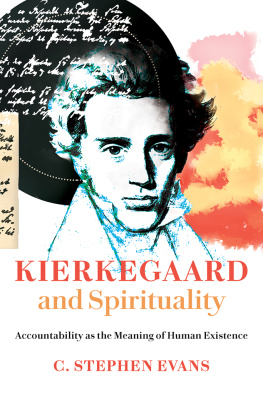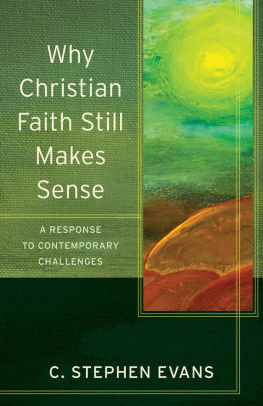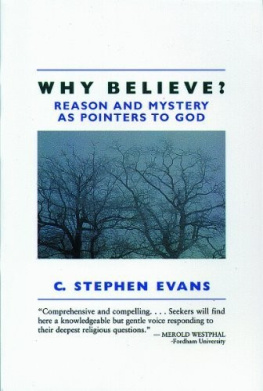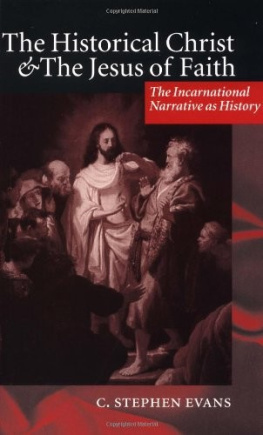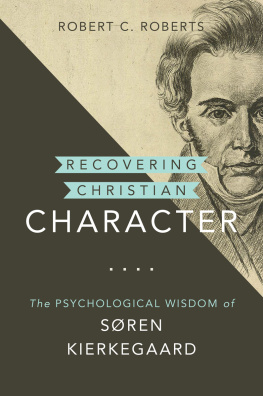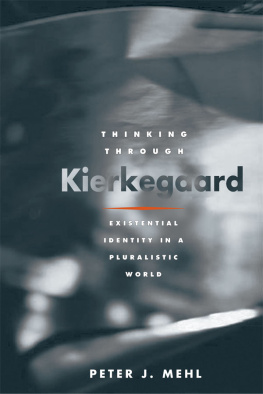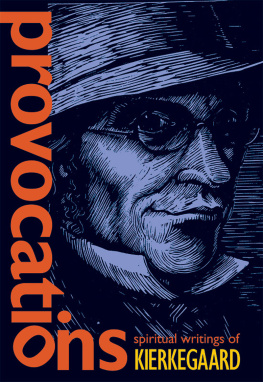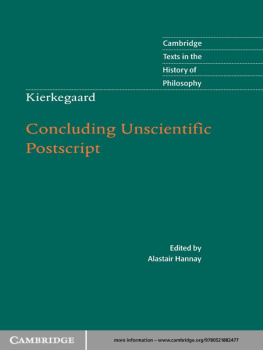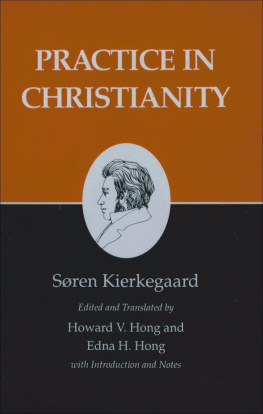KIERKEGAARD AS A CHRISTIAN THINKER
C. STEPHEN EVANS AND PAUL MARTENS
General Editors
The KIERKEGAARD AS A CHRISTIAN THINKER series seeks to promote and enrich an understanding of Sren Kierkegaard as a Christian thinker who, despite his many critiques of Christendom, self-consciously worked within the Christian tradition and in the service of Christianity. Volumes in the series may approach Kierkegaards relationship to Christianity historically or topically, philosophically or theologically. Some will attempt to illuminate Kierkegaards thought by examining his works through the lens of Christian faith; others will use Kierkegaards Christian insights to address contemporary problems and competing non-Christian perspectives.
That Sren Kierkegaard profoundly influenced nineteenth- and twentieth-century theology and philosophy is not in doubt. The direction, extent, and value of his influence, however, have always been hotly contested. For example, in the early decades of the twentieth century, German theologians Karl Barth, Dietrich Bonhoeffer, and Emil Brunner all acknowledged deep debts to Kierkegaard, debts that would echo through the theological debates of the entire century. In spite of this, by the middle of the twentieth century, Kierkegaard was also hailed (or cursed) as a father of existentialism and nihilism because of his appropriation by Heidegger, Sartre, and others. At the same time, however, he was beginning to become the reveille for a return to true Christianity in North America through the translating efforts of Walter Lowrie and David Swenson. At the beginning of the twenty-first century, Kierkegaards legacy is once again being seriously and rigorously debated.
While acknowledging and affirming the postmodern appreciation of elements of Kierkegaards thought (such as irony, indirect communication, and pseudonymity), this series aims to engage Kierkegaard as a Christian thinker who self-consciously worked as a Christian in the service of Christianity. And, as the current discussion crosses the traditional boundaries of philosophy and theology, this series will necessarily do the same. What these volumes all share, however, is the task of articulating Kierkegaards continuities with, challenges to, and resources for Christianity today. It is our hope that, in this way, this series will deepen and enrich the manifold contemporary debates concerning Kierkegaard and his legacy.
KIERKEGAARD AS A CHRISTIAN THINKER
Eros and Self-Emptying: The Intersections of Augustine and Kierkegaard
Lee C. Barrett
Kierkegaard and the Paradox of Religious Diversity
George B. Connell
Kierkegaards Concept of Faith
Merold Westphal
KIERKEGAARD
AND SPIRITUALITY
Accountability as the Meaning of Human Existence
C. Stephen Evans
WILLIAM B. EERDMANS PUBLISHING COMPANY
GRAND RAPIDS, MICHIGAN
Wm. B. Eerdmans Publishing Co.
4035 Park East Court SE, Grand Rapids, Michigan 49546
www.eerdmans.com
2019 C. Stephen Evans
All rights reserved
Published 2019
252423222120191234567
ISBN 978-0-8028-7286-9
eISBN 978-1-4674-5664-7
Names: Evans, C. Stephen, author.
Title: Kierkegaard and spirituality : accountability as the meaning of human existence / C. Stephen Evans.
Description: Grand Rapids : Eerdmans Publishing Co., 2019. | Series: Kierkegaard as a Christian thinker | Includes bibliographical references and index.
Identifiers: LCCN 2019017687 | ISBN 9780802872869 (pbk. : alk. paper)
Subjects: LCSH: Kierkegaard, Sren, 18131855. | SpiritualityChristianity.
Classification: LCC BX4827.K5 E93 2019 | DDC 230/.044092dc23
LC record available at https://lccn.loc.gov/2019017687
Contents
This book is an attempt to provide an understanding of Kierkegaard as a spiritual writer, a thinker who has much to offer someone who is interested in what it means to live as a spiritual person and to develop genuine spirituality. I have spent much of the last fifty years studying and writing about Kierkegaard. I have always believed that the center of Kierkegaards work is his deep Christian faith. However, most of my work on Kierkegaard to this point has centered on Kierkegaards contributions to Christian philosophy and theology. In this book, I have tried to give an account of what it means to live spiritually, looking at two different forms of spirituality: a generic human spirituality and a spirituality that is distinctively Christian. Kierkegaard has much to offer on both counts.
I try to show that spirituality is for Kierkegaard something that is grounded in our very nature as human beings. There is a sense in which human beings are always spiritual beings. Some of this spirituality is not recognized as such, and much of it is what we might call inauthentic or counterfeit spirituality. However, there are rich possibilities to live spiritually even outside of Christian faith. Kierkegaard clearly respects and appreciates this kind of spirituality, which I call Socratic spirituality in this book. Nonetheless, Christian faith offers the deepest and most profound possibilities for spiritual life as Kierkegaard sees it.
The heart of genuine spirituality, according to Kierkegaard, lies in seeing human existence as a task that is assigned by God to every individual. This is true for both Socratic spirituality and Christian spirituality; the upshot is that the spiritual life is relational. We live spiritually when we live before God, or coram Deo, as older theologians said. For Kierkegaard, therefore, spirituality requires a quality that I call accountability, the virtue that is present when a person is grateful for the task God assigns, and understands that being accountable to God is a gift. The task is grounded in the debt we owe to God. However, the nature of the debt, and the nature of the task, is profoundly altered when God is known through Christ, God incarnate in human form, a God known not through philosophical reflection but in history.
Along the way, I deal with the worry some have raised that Kierkegaardian spirituality ultimately is incompatible with our humanness. I argue that this is not the case. Although Kierkegaardian spirituality makes strenuous demands on us, it is still a form of Christian humanism, although I admit that there are themes in Kierkegaards final attack on Christendom that cannot be defended. Hence, my view, though a defense of Kierkegaardian spirituality, is not completely uncritical. Besides criticizing some of the newspaper and magazine articles Kierkegaard wrote in 185455, I raise some worries at times for other elements in Kierkegaards view of spiritual life.
This book had its origin in a fellowship I held at the Biola Center for Christian Thought in the spring semester of 2013. The theme for the center that year was spirituality and its relation to human psychology. During that year, I wrote an article, Living Before God: A Kierkegaardian View of Spirituality. This article was the seed of this book. The Biola Center for Christian Thought was supported during that period by a grant from the John Templeton Foundation, and I am deeply grateful for this fellowship that made possible the ideas that eventually led to this book.
I am also deeply grateful to the Templeton Religion Trust (TRT), which awarded an inception grant for the school year 201718 to an interdisciplinary group of seven scholars, headed by myself, to think more deeply about accountability, understood as a virtue. This grant provided time for me to complete this book, which is therefore the firstfruits of this research project on accountability. The team has since been awarded a three-year grant from TRT to study accountability as a virtue, working from the perspectives of philosophy, theology, psychology, psychiatry, and sociology. I am deeply grateful to the Templeton Religion Trust for this support.

